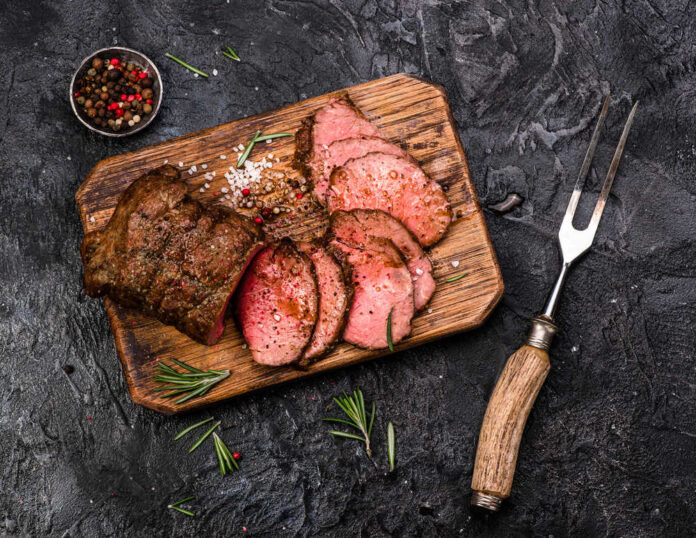
The food you eat has a direct impact on your health.
As food is digested, broken down into its molecular components, and absorbed into your bloodstream, it will affect your cells, tissues, and organs in different ways depending on what molecular compounds were present in those foods.
For example, when you eat carbs, your body will convert that food into glucose (blood sugar), which can then be used as an energy source by your cells and tissues. For blood sugar to be used by your tissues as fuel, it needs insulin to act as a “key” to open up the cell membrane so that glucose can enter.
Red Meats and Processed Meats
When you eat a lot of red meat and processed meats (hot dogs, sausages, bacon, deli meats, etc.), these foods contain a lot of saturated fats.
Filling your body with saturated fats day after day then accumulates these fatty acids in your adipose tissues and liver, causing inflammation and insulin resistance.
Insulin resistance means that insulin is less effective at “opening the door” for blood sugar to enter your cells—the “locks” (insulin receptor sites) are “clogged” with fatty deposits, so the insulin “key” can’t do its job. Then, since blood sugar can’t get into your cells, it stays in your bloodstream at higher levels than normal. This situation is known as type 2 diabetes.
If your blood sugar levels stay too high for an extended period, this will cause damage to your blood vessels, nerves, and organs, leading to a host of potentially life-threatening health complications.
Trans Fats
In addition to saturated fats from meat, trans fats will also raise your risk for insulin resistance and type 2 diabetes.
Trans fats are created when manufacturers “hydrogenate” oils to make them solid at room temperature, extending product shelf life and making them easier to work with in food manufacturing.
You’ll find trans fats in:
- Packaged baked goods
- Margarines and other spreads
- Chips
- Crackers
- Most processed snacks and meals
- Fried foods
Trans fats contribute to insulin resistance and raise your risk for type 2 diabetes, but they also increase your risk for heart disease and many other chronic illnesses, so avoid them as much as possible.
Refined Carbohydrates
Once you are pre-diabetic or insulin resistant, refined carbs will only make things worse.
Refined carbs are those that have been processed and had the fiber, and other nutrients stripped away, leaving only the simple sugar molecules.
Examples of refined carbs include:
- White bread and other white flour products
- Sugary breakfast cereals
- Pastries and sweets
- Pasta
- White rice
When you eat refined carbs, your body quickly breaks them down into simple sugars, which are absorbed into your bloodstream rapidly. And since insulin cannot clear the sugar from your bloodstream as efficiently as it usually would, your blood sugar levels will rise sharply and put you at risk for complications of type 2 diabetes.
Sugar-Sweetened Beverages
Sugar-sweetened beverages, such as soda, sports drinks, and fruit juices, will also cause your blood sugar to spike.
The high-fructose corn syrup in most of these drinks will likely worsen your insulin sensitivity and further increase your risk of developing type 2 diabetes.
Plus, the simple sugars in these drinks get absorbed into your bloodstream quickly, potentially resulting in dangerous blood sugar spikes.
Diet sodas are not any better. Manufacturers often add artificial sweeteners to make diet sodas taste better, which bring in additional health risks.
What To Eat Instead
So if these foods and drinks can increase your risk for insulin resistance and type 2 diabetes, what foods will have the opposite effect?
- Instead of red meat and fried foods, include fish, beans, nuts, and seeds as your primary source of protein. These options contain high omega-3 unsaturated fatty acids, which won’t promote insulin resistance like saturated fats.
- Replace refined carbs with high-fiber, whole-grain options, such as whole wheat bread, brown rice, and oats. These foods are digested more slowly, so your blood sugar levels won’t spike as rapidly.
- Instead of soda and sugary drinks, opt for unsweetened tea or coffee, seltzer water with a twist of lemon or lime, or plain old water.
And finally, make sure you include plenty of fresh vegetables and fruits in your diet. By restricting intake of the foods known to contribute to the development of type 2 diabetes and maximizing your intake of plant-based foods, many people can prevent or even reverse insulin resistance and diabetes.
Talk to your doctor about what you can do to reduce your risk for insulin resistance and type 2 diabetes. And if you already have diabetes, be sure to work with your healthcare team to create a meal plan that is right for you.






















